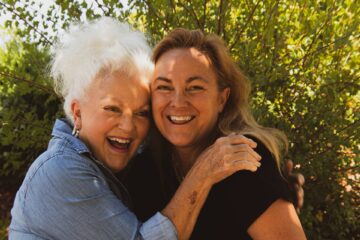What makes the elderly happy? Aging is not synonymous with sadness but with happiness! Who would have believed that? So gnawed at by our own fear of aging, we often imagine older people as less happy on a daily basis. And yet, studies show that older people are happier than younger people! That’s enough to be less afraid of growing old!
Happiness! We all dream of it, for sure! However, it is within our reach! And yes, even at 50. Especially at 50: we can be happy! All we have to do is adopt good habits to learn how to be happy.
As proof: in a 2016 study, seniors said they were moral and, even more, felt young. Moreover, 55% of them even refuse to use the term “old age,” which they feel is not appropriate until they reach the canonical age of 80. We owe these very serious results to an observatory conducted with a sample of 1000 people by Ipsos. Moreover, the vast majority of them (82% of 55-75-year-olds) feel younger than their age. They show vitality and a great thirst for life!
HAPPY SENIORS? WHAT DO THE STUDIES SAY
As we age, our perspectives on happiness may shift, and studies have shown that older adults can experience a high level of happiness and life satisfaction. Here are some key findings from research on happiness in older age:
- The Longitudinal Study of Aging (1995): A study of 32,000 individuals aged 68-77 found that 38% of respondents reported being very happy. This study emphasized the presence of positive emotions and overall life satisfaction among older adults.
- The Danish Study on Aging (2015): A Danish study examined the happiness levels of older individuals compared to younger age groups. Surprisingly, the study found that older adults reported similar levels of happiness as their younger counterparts. This challenges the notion that happiness declines with age.
- The Harvard Study of Adult Development: This ongoing study, spanning over 80 years, has followed a group of men throughout their lives. The study has consistently found that relationships and social connections are key factors in promoting happiness and well-being, even in later life. The quality of relationships, rather than the quantity, plays a significant role in shaping happiness.
- Emotional Regulation: Research suggests that older adults have a greater ability to regulate their emotions, leading to a decrease in negative emotions over time. Psychologists who followed more than 2,800 people over 23 years noticed that the older people became, the less they experienced negative emotions. This phenomenon, known as the “positivity effect,” reflects a shift towards more positive emotional experiences and enhanced emotional well-being in older age.
- Sense of Purpose and Wisdom: Studies have shown that having a sense of purpose and meaning in life contributes to higher levels of happiness and well-being among older adults. Engaging in activities that align with personal values, setting meaningful goals, and maintaining a sense of connection to the community can foster a sense of purpose and enhance overall life satisfaction.
It is important to note that happiness is subjective and can vary among individuals. Factors such as health, social support, financial stability, and personal circumstances can influence happiness levels in older age. However, the research indicates that aging itself does not necessarily lead to a decline in happiness. Instead, it highlights the potential for older adults to experience happiness, life satisfaction, and emotional well-being.
By understanding the factors that contribute to happiness in older age, we can better support and empower seniors to lead fulfilling and joyful lives. It is crucial to foster social connections, promote emotional well-being, and provide opportunities for personal growth and engagement. Creating age-friendly environments that value and respect older adults’ experiences and contributions can further enhance their happiness and overall quality of life.
For additional information and resources on happiness in older age, you may find the following references helpful:
- Journal of Aging Studies: link
- The Journal of Happiness Studies: link
- The World Happiness Report: link
- The Positive Psychology Center at the University of Pennsylvania: link
Remember, promoting happiness and well-being among seniors is a collective effort that involves societal support, individual empowerment, and a positive outlook on aging.
HOW DOES HAPPINESS COME TO THE ELDERLY?
Older people focus more on positive things. It seems that older people are on an approach that leads to moral well-being.
Also according to one study, older people seem to review their past in a happier way than younger people actually would. On the contrary, younger people tend to reinforce the negative side of events they have experienced. Older people choose to remember the good side of things. It even works unconsciously, because they look away from the negative.
In fact, in one study, a group of older people and a group of young people were asked to watch the same movie about cancer. Observing their behavior, it was noticed that the older people looked less closely at unpleasant images (bad scenes, scar images). It also worked for other scenes, such as accidents, funerals… On the contrary, the elderly gave a longer gaze to happy images.
MODIFIED BRAIN ACTIVITY
It seems that the brains of the elderly don’t work the same way when it comes to emotions!
During an experiment, a group of elderly people and a group of people under 38 had to watch videos with happy, angry or neutral faces. Meanwhile, the scientists observed the functioning of their brains by magnetic resonance imaging.
At the end of the experiment, two days later, the scientists noticed that the older group of people remembered a lot of the positive images, while the younger ones remembered more of the negative.
It was found that the older people who remembered more of the positive were those whose part of the brain worked the most. This area of the brain includes the amygdala which plays a role in emotions and the medial prefrontal cortex which plays a role in decision-making.
Older people would therefore have a change in the functioning of their brains that would make them more positive. But this is not the main explanation for happy elderly people. In fact, people with Alzheimer’s have changes in this area of the brain, and yet not all of them are very happy.
The happiest are those who have better cognitive functions.
Unfortunately for those with cognitive impairments, it appears that cognitive functions affect happiness based on cognitive tests conducted as part of a study on the morale of the elderly. This would suggest that older people are happier because they want to be. They focus on the positives and all the gestures in daily life that are good for them. This requires good concentration skills.
HAPPY SENIORS: HOW TO AGE GRACEFULLY AND MAINTAIN COGNITIVE WELL-BEING
Aging is a natural process, but maintaining cognitive functions requires effort and proactive engagement. Just like physical exercise is crucial for maintaining a healthy body, stimulating the mind is essential for preserving cognitive abilities as we grow older.
Numerous studies have shown that engaging in activities that challenge the brain can help improve memory, concentration, language skills, and overall cognitive function. These activities can range from simple puzzles and word games to more complex mental exercises such as learning a new language, playing a musical instrument, or engaging in strategic board games like chess.
Physical exercise has also been found to have significant cognitive benefits. Regular aerobic exercises, such as brisk walking, swimming, or cycling, increase blood flow to the brain, stimulate the growth of new neurons, and enhance cognitive abilities. Additionally, incorporating strength training exercises can improve overall muscle strength and balance, reducing the risk of falls and maintaining independence in daily activities.
Furthermore, social interaction and emotional well-being play crucial roles in maintaining cognitive health. Engaging in social activities, joining community groups, volunteering, or participating in group classes can provide mental stimulation, a sense of purpose, and emotional support. Maintaining a positive attitude, practicing mindfulness and stress management techniques, and nurturing meaningful relationships are also essential for overall well-being and cognitive vitality.
If you have an elderly loved one in your life, there are several ways you can help them maintain cognitive well-being and age happily. Encourage and support their participation in activities that stimulate the mind, such as joining a book club, attending educational workshops, or pursuing hobbies and interests they enjoy. Offer to accompany them on walks or exercise sessions to promote physical activity. Provide opportunities for social interaction by organizing family gatherings or encouraging involvement in community events.
It’s important to note that each individual’s cognitive abilities and preferences may vary, so it’s essential to tailor activities and support to their specific needs and interests. Additionally, consult with healthcare professionals and experts in geriatric care for personalized recommendations and guidance.
By adopting a holistic approach that incorporates physical exercise, mental stimulation, social interaction, and emotional well-being, we can help seniors lead fulfilling lives, maintain cognitive health, and age gracefully.
For further information and resources on promoting cognitive well-being and healthy aging, you may find the following references helpful:
- Alzheimer’s Association: link
- National Institute on Aging: link
- Mayo Clinic: link
- Harvard Health Publishing: link
- AARP: link
- World Health Organization (WHO): link
- American Psychological Association: link
Remember, it’s never too late to invest in cognitive well-being and embrace the joys of aging with vitality and happiness.
HAPPY ELDERLY ARE SATISFIED WITH THEIR LIVES
Happy seniors are satisfied with their lives. 77% also say they are satisfied with their lives so far, 86% with their social life, and 85% with their intellectual and cultural activities. So this is apparently the secret of happiness. This is also knowing how to integrate all your experiences as you live to finally have a successful life.
The secret: to believe in yourself. Happiness depends above all on our state of mind, not on our financial or social status. It is determined by how we choose to interpret external events. For example, do we see failure as catastrophic or do we see it as an opportunity to learn?
Then let’s push aside all negative thoughts that suggest happiness is not meant for us. Rather, let’s actively work in a good mood by adopting good habits because, ultimately, our happiness essentially depends on the image we have of ourselves.










